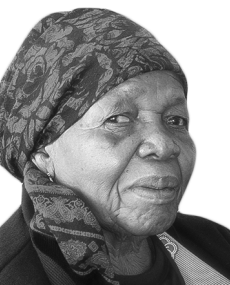
Provided a safe house for exiled South Africans living in Swaziland (now Eswatini), recipient of the Government’s National Order of Luthuli
Affectionately known as ‘Magogo’ (meaning grandmother – a title bestowed to her for her motherly, nurturing character), Rebecca Makgomo Masilela (nee Kekana) was born on 12 December 1928 in Hammanskraal, north of Pretoria, Transvaal Province (now Gauteng), previously Farm 396, Leeuwkraal. Her father, Abraham Jambo Kekana, who was acting Chief of the Ndebele on three occasions until his death on 6 June 1964, bought Leeuwkraal on behalf of the Ndebele people and later renamed it Kekanastaad.
In 1945, soon after the Second World War, Masilela met Solomon Buthongo Masilela (popularly known as ‘Thongo’) who had just returned from the war. The two met at the Lutheran church they both attended in Kekanastaad and married six years later in 1951.
As a consequence of the injustices brought on by apartheid, Masilela and her husband decided to leave South Africa for Swaziland (now Eswatini) in the early 1960s. Once in Eswatini, it was there that Masilela would come to play a crucial role in the liberation struggle, aiding the African National Congress (ANC) from her home (which would later be known as’ kwaMagogo’, meaning ‘grandmother’s place’).
Her house, Number 43 in Trelawney Park, sheltered, conscientised, and developed countless ANC members, particularly operatives of its military wing, Umkhonto weSizwe (MK), who were exiled from South Africa. However, it was not the only house to do so. ‘Number 43’ worked side by side with the ‘White House’, which was also in Trelawney Park, and ‘Come Again’ in Fairview, Eswatini (but outlived both properties).
The safe house, ‘Come Again’, was operated by Bafana ‘uMdumane’ Duma and was used by prominent figures like former Presidents Thabo Mbeki and Jacob Zuma during their stay in Eswatini. The ‘White House’, which was established by John Nkadimeng when he arrived in Eswatini in 1976, replaced ‘Come Again’. The house became the predominant safe house for the ANC at the time, and Nkadimeng specifically chose a house in Trelawney Park for its strategic proximity to Masilela’s ‘Number 43’. Over many years, the ANC used ‘Number 43’ as a base and a bridge with the ‘White House’. Today, Masilela’s house has been immortalised by her son, Elias Masilela, who chronicled her selfless work (as well as the activities of the ANC in Eswatini) in his book, Number 43 Trelawney Park, kwaMagogo (2007). During the book launch, Masilela was acknowledged and praised by King Mswati III of Eswatini and Jacob Zuma.
This was not the only recognition Masilela enjoyed for her invaluable contribution. In August 2006, on Women’s Day, she was recognised by then-President Thabo Mbeki as one of the leading women veterans of the struggle. She received similar praise from various leaders and government officials, including the former Premier of Mpumalanga, Thabang Makwetla, the former Premier of Limpopo, Sello Moloto, Sydney Mufamadi, Midiavhathu Tshivhase, and Chief Vha-Musanda Vho-Thobela.
In 2009, she was posthumously bestowed the Government’s National Order of Luthuli in Silver for her commitment to the liberation movement by providing a place of refuge for exiled cadres. The Order is awarded to individuals who have made a meaningful contribution to the struggle for human rights, democracy, nation-building, conflict resolution, as well as justice and peace. In addition, ‘Number 43’ has been equated to the Lilliesleaf Farm in Rivonia, Johannesburg, Transvaal Province (now Gauteng), for its important role in ensuring that the liberation struggle flame continued to burn regardless of everything that the apartheid government threw at it.
Masilela and her husband had nine children – all of whom contributed to the struggle to varying degrees. The details of the family’s involvement are recorded in the book written by her son, and some of these activities are recorded in the Truth and Reconciliation Commission (TRC) Report from the accounts of comrades, friends, and foes who operated from and around ‘Number 43’.
Described by many as a woman who was forever nurturing to those who needed it, Masilela led a quiet yet valiant fight against the apartheid regime out of a seemingly ordinary family home. She did this over a period covering about forty years, which included the most trying times of the incessant South African death squads who wreaked havoc not only in Eswatini but throughout the entire Southern African region.
Rebecca ‘Magogo’ Masilela died on 30 September 2007 but her legacy continues to live on in the hearts of all those she touched. Her contribution is justly counted amongst those that helped to topple the oppressive regime for democracy to reign in South Africa.